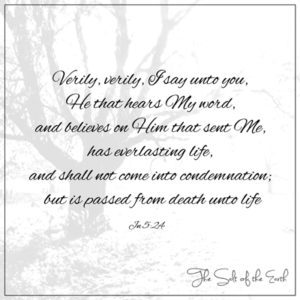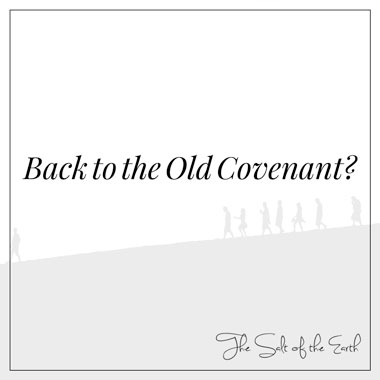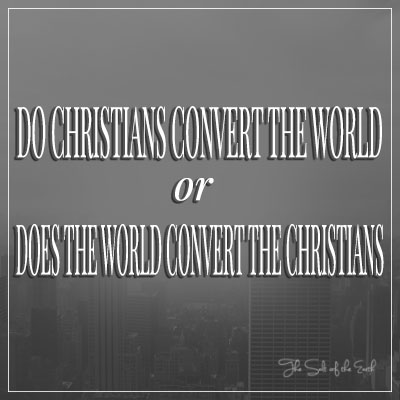When some of the Pharisees heard the words of Jesus, how He had come for judgment into the world, that they which see not might see and that they which see might be made blind, they asked Jesus if they were also blind. Jesus answered them, if you were blind, you should have no sin: but now you say, we see; therefore your sin remains. What did Jesus mean by that? What do these words of Jesus mean for the church? Is the church seeing or blind?
Jesus made the blind to see, but the seeing blind
The blind man received his sight, because he heard and believed the words of Jesus and obeyed them and therefore he did what Jesus commanded him to do. He believed that Jesus was (and still is) the Christ. But the Pharisees, who were scholars of the law and the prophets and should have been acquainted with the words and the will of God and the prophecies about the Christ should have recognized Jesus as the Son of God and the Christ, but they didn’t believe the words of Jesus and didn’t believe that Jesus was the Christ, but rejected Him.
Just like they didn’t believe that God had sent John the Baptist to the earth to prepare the way for the coming of Jesus Christ and therefore they refused to believe and obey the words and commandment of John the Baptist and repent and be baptized (o.a. Mataio 21:32, A tai'o atoa: John the Baptist, the man who didn’t bow).
The Pharisees had a position of power and were full of themselves and relied on their own wisdom, insight, skills, and works.
They were self-righteous and considered themselves as righteous men, while their nature was evil and their works were not according to the will of God.
The Pharisees’ mind was spiritually blinded. They were assuming that they were the exception to the rule and were elevated above the people. This pride held them in bondage and restrained them to humble themselves and repent and turn from their evil ways and turn to God.
A man’s pride will never bring man to repentance, but man’s pride will cause a man to walk in darkness and persevere in sin.
Whosoever says he sees but perseveres in sin, his sin remains
And Jesus said, For judgment I am come into this world, that they which see not might see; and that they which see might be made blind. And some of the Pharisees which were with Him heard these words, and said unto Him, Are we blind also? Jesus said unto them, If ye were blind, ye should have no sin: but now ye say, We see; therefore your sin remaineth. (John 9:39-41)
When some of the Pharisees asked Jesus if they were blind also, Jesus answered them, if you were blind you should have no sin, but now you say, we see, therefore your sin remains. Jesus was saying that if the Pharisees, whose works were evil and therefore they did things that diametrically oppose the will of God and they didn’t submit to the words and the will of God, were blind then they would have no sin. But because they said they saw, while they walked in darkness and did things that diametrically opposed the will of God and they didn’t submit to the words and the will of God and therefore they sinned, their sin remained.
Jesus testified, that the works of the flesh are evil and everyone, who perseveres in sin walks in darkness and does the lusts and the will of their father the devil, who is the ruler of this world. If someone perseveres in sin doesn’t walk in the light and doesn’t do the will of God and doesn’t belong to God but the devil (a.o. John 8:44, Kolosa 1:21, Titus 1:16, 1 John 3:4-10).
Although the person may say he sees, the person is in reality spiritually blind, because the person doesn’t see that the works of the flesh and the darkness are evil, and if the person is aware of the fact that the works of the flesh and the darkness are evil, but do them anyway, the person shall receive greater damnation (A tai'o atoa: Can you keep sinning under grace?).
What did the Pharisees do wrong?
While the Pharisees were self-righteous and full of themselves and thought they walked piously, Jesus thought otherwise. I roto i te Mataio 23, i rotopu i te tahi atu mau taata, Jesus spoke in the temple to the multitude and His disciples about the walk and works of the Pharisees and Scribes.
Jesus didn’t remain silent but exposed their works.
Ofcourse there were many among the chief rulers, who did believe in Jesus, but they didn’t confess Him, lest they should be put out of the synagogue, for they loved the praise of men more than the praise of God (John 12:42-43).
But the majority of the Pharisees and Scribes were blind guides, hypocrites, white sepulchres, serpents, and a generation of vipers, who didn’t remain in the truth of God, just like their father the devil, who didn’t remain in the truth of God but because of his pride became an infidel and fell from his position (A tai'o atoa: The battle in the garden).
Although the Scribes and Pharisees sat in Moses’ seat and taught the people, they did not do what they taught and commanded the people to do. They bound heavy burdens and grievous to be borne and laid them on men’s shoulders, but they would not move them with one of their fingers.
They only did all their works to be seen by the people and admired and worshiped by the people. No reira, they did the works for selfish reasons (A tai'o atoa: What is the difference between Jesus and the religious leaders?).
The Pharisees were hypocrites and blind guides
The Pharisees and Scribes were hypocrites; actors of the stage of life, who played the role of something which they were not, because:
- They shut up the Kingdom of God against men, for they neither went in themselves, neither suffered they them that were entering to go in
- They devoured widows’ houses and for a pretense made long prayer
- They compassed sea and land to make one proselyte and when he was made they made him twofold more the child of hell than themselves
- The paid tithe of mint and anise and cummin, and had omitted the weightier matters of the law, judgment, mercy, and faith.
- They were blind guides, that strained at a gnat and swallowed a camel
- They cleansed the outside of the cup and of the platter, but within they were full of extortion and excess.
- They were like whited sepulchres, which indeed appeared beautiful outward, but were within full of dead men’s bones, and of all uncleanness. Even so they also outwardly appeared righteous unto men, but within they were full of hypocrisy and iniquity.
- They built the tombs of the prophets, and garnished the sepulchres of the righteous, And said, If they had been in the days of their fathers, they would not have been partakers with them in the blood of the prophets. Wherefore they were witnesses unto themselves, that they were the children of them which killed the prophets and would fill up the measures of their fathers.
The Pharisees and Scribes were serpents, a generation of vipers. How could they escape the damnation of hell?
Jesus prophesied and told the Pharisees and Scribes, that He would send unto them prophets, and wise men, and scribes: and some of them they would kill and crucify; and some of them they would scourge in their synagogues, and persecute them from city to city:, so that upon them might come all the righteous blood shed upon the earth, from the blood of righteous Abel unto the blood of Zacharias son of Barachias, whom they slew between the temple and the altar (A tai'o atoa: Why did God not respect Cain’s offering?).
What did the Pharisees do after being confronted with the Word?
After Jesus had spoken these words and had confronted the Pharisees and Scribes with their sins, the Pharisees and Scribes had again a choice, through the confrontation with the Word and the conviction of their sin, to humble themselves and repent or not.
The Pharisees chose the latter, whereby the words of Jesus became fulfilled and they not only killed Jesus Christ, the Son of God, and had Him crucified, but they also persecuted His Church and even killed some of the Church to silence the believers and extinguish the light (A tai'o atoa: How the darkness extinguishes the light).
And this still happens, because the same spirit that worked in the Pharisees and Scribes is still active and at work in the lives of many church leaders (A tai'o atoa: What are the similarities between the leaders of God’s people then and now?)
Jesus and the apostles warned the believers of false prophets and false teachers
For false Christs and false prophets shall rise, and shall shew signs and wonders, to seduce, if it were possible, even the elect. But take ye heed: behold, I have foretold you all things (Mareko 13:22-23 (Also Matthew 24:24-25))
Beware of false prophets, which come to you in sheep’s clothing, but inwardly they are ravening wolves. Ye shall know them by their fruits (Mataio 7:15-16)
But there were false prophets also among the people, even as there shall be false teachers among you, who privily shall bring in damnable heresies, even denying the Lord that bought them, and bring upon themselves swift destruction. And many shall follow their pernicious ways; by reason of whom the way of truth shall be evil spoken of. And through covetousness shall they with feigned words make merchandise of you: whose judgment now of a long time lingereth not, and their damnation slumbereth not (2 Peter 2:1-3)
Beloved, believe not every spirit, but try the spirits whether they are of God: because many false prophets are gone out into the world. Hereby know ye the Spirit of God: Every spirit that confesseth that Jesus Christ is come in the flesh is of God: And every spirit that confesseth not that Jesus Christ is come in the flesh is not of God: and this is that spirit of antichrist, whereof ye have heard that it should come; and even now already is it in the world (1 John 4:1-3)
Jesus and then the apostles prophesied and warned the believers about this in their letters, since they knew their adversary, te diabolo, and were acquainted with his works.
They knew that their enemy was not indirectly people, but their enemy was the one, who has dominion over people, no te ao nei (the darkness), and controls them; te diabolo.
The apostles and disciples of Jesus were not carnal but they were just like Jesus spiritual through regeneration in Christ. They knew they were soldiers of Christ in the spiritual warfare and executed His power on earth and didn’t fight against flesh and blood but against principalities, Te mau mana, rulers of the darkness of this world, pato'iraa i te ino pae varua i te mau vahi teitei, which, i rotopu i te tahi atu mau taata, reigned in the lives of the blind religious leaders and persecuted the Church of Christ and are still active and working in the lives of many people, including the leaders of many churches.
Is the church seeing or blind?
His watchmen are blind: they are all ignorant, they are all dumb dogs, they cannot bark; sleeping, lying down, loving to slumber. Yeah, they are greedy dogs which can never have enough, and they are shepherds that cannot understand: they all look to their own way, every one for his gain, from his quarter. Come ye, say they, I will fetch wine, and we will fill ourselves with strong drink; and to morrow shall be as this day, and much more abundant (Isaiah 56:10-12)
Because the Church has not listened to the Word and has ignored the warnings of the Word and the Holy Spirit and has not been spiritually awake, but is misled, through the deceptive spirits of darkness, a change has taken place in the Church and the Body of Christ moved from the Spirit to the flesh, whereby the spirits of darkness have been given free rein and the devil has established his throne in many churches (A tai'o atoa: The throne of satan e How the world church is being prepared for the antichrist).
Many believers don’t fear the Lord anymore and the knowledge of the will of God and His Kingdom and of good and evil is gone. They don’t discern the spirits, but they have become prideful and refuse to submit to Jesus Christ; the Word, and change and keep His commandments.
Many have become lukewarm regarding the things of the Spirit and the Kingdom of God and have become indifferent toward sin and unrighteousness.
They don’t consider sin as evil; as the will of the devil and the fruit of death, but they consider sin as normal and part of human nature.
They have normalized sin, so they don’t have to change and put off the old man, e tamau noa râ i te rave i te mau ohipa o te tino nei, and because of that their lives remain unchanged and they keep living like the world. They don’t testify of Jesus Christ and don’t call their neighbors to repentance but let them alone and speak what they want to hear because they don’t want to cause problems (A tai'o atoa: If Christians stay silent, who shall set the captives of darkness free?)
And so many say they are born again and are spiritual and see and think they live in the truth, while their works testify that they are blind and still walk in darkness and do the lust of their father, just like the Pharisees, who didn’t see but were blind.
And because they say they see, and therefore they say that they are acquainted with the will of God and have the knowledge and spiritual understanding and know that sin is not good but evil, and so continue to sin willfully, their sins shall remain.
'Ia riro ei miti no te fenua’





